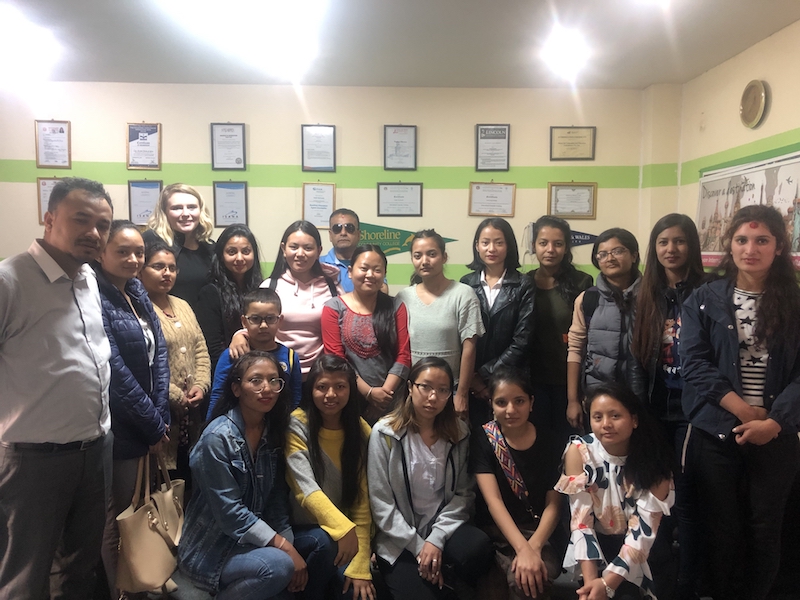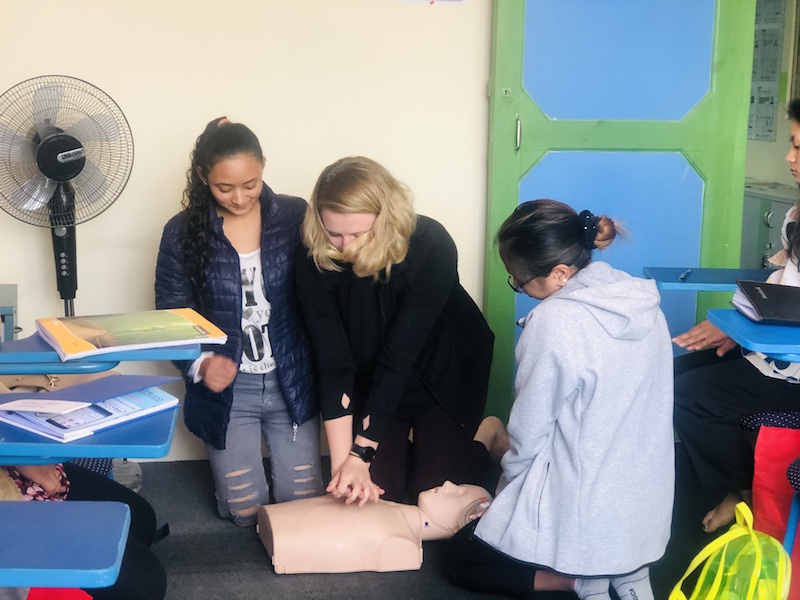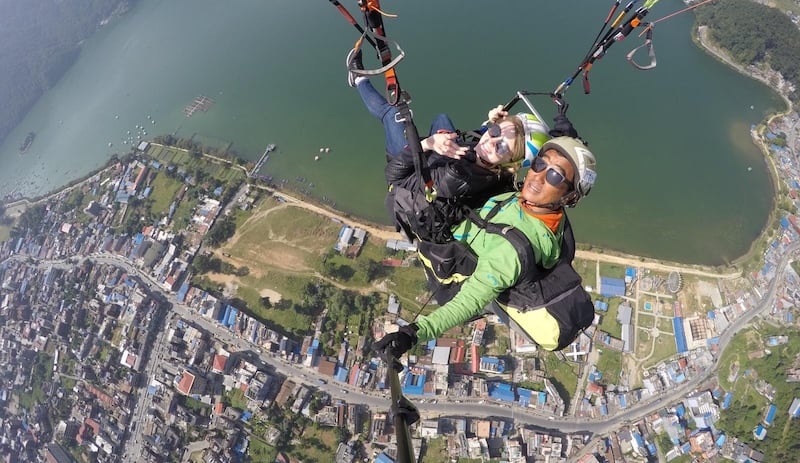Before coming to Nepal, I was told in an email communication to be as flexible and open-minded as possible.

1. - Hi tell us about you:
- Full name (first and last): Desiree Cochran
- Age: 25
- What do you do (study or work, where): Work as a Nurse in USA
- Where are you from (city and country): Ithaca, NY, USA
1.1. - Why did you choose to volunteer in Nepal Kathmandu, what program(s) are you doing and why?
- Why Nepal: I wanted to go to Asia and had recently watched documentation based in Nepal that intrigued me. I researched Nepal more and found it was easy going place and good for solo travel.
- What program: I came here for a medical program and worked in a hospital.
- Why this program: I recently did other medical trips in Europe and Africa and was interested in Nepal health. I came to Nepal to expand my horizons even more into Global health.
2. What was the most surprising thing you experienced while in the program?
- Program: I was surprised to see the level of acuity of patients that were cured for at the hospital. This resulted in them doing large but well done grafts. Unfortunately, I saw nurses blatantly make up vital signs on patients. Lastly, privacy in health care is not a priority here.
- Host Family: I was surprised how accommodating the host family was and how frequently they checked in. I usually take a while to warm up but I felt comfortable just walking into their home and sitting down with them.
- Country: I was surprised how little is invested into the infrastructure of roads here and how that has such a large impact on the time it takes to travel. Traffic becomes pure chaos and I’m surprised there are not more accidents.

3. What was the most difficult thing you experienced while in the program?
- Program: At the hospital, I watched practices I would never engage in as a nurse, like pulling crust off of wounds and making people re-bleed or making vital signs. It was hard for me to jump in and help because I didn’t want to engage in those things.
- Host Family: At first, the language barrier between me and auntie was difficult to navigate, especially because she made me food. It becomes fun when I started learning Nepali.
- Country: I didn’t care for how often and how hard I had to haggle for everything. I was constantly immediately up charged.
4. Any tips for future volunteers….
- Clothing: Be conservative in dressing to cover your knees, chest and shoulders, but you can still quite modern. You can wear jeans everyone does. Female don’t need skirts. They issue scrubs at this hospital so you don’t need.
- Sightseeing: It always cost tourists here to enter a temple ( Heritage Sites) than the locals, so bring enough cost.
- Donations: Bring donations to the administrator of the hospital rather than giving to nurses. Gloves to fit you are good idea. They only use small and XS.
- Laundry/internet: Internet is mostly good but sometimes inconsistent having a small amount of data available through my provider was really helpful at times.
5. Other things volunteers should know about:
- City/town: It takes a long time to get to any good sightseeing spots. Plan to catch a car or wait for the bus and expect a crowded bus at that.
- Weather: Mostly warm weather in October and November but it was cold in the morning. Wearing pants every day became the norml. Layering is key throughout the day.
- Local People: Local People will most definitely stare and be anxious about you. Some will stop and ask. It became a daily occurrence with me.
- Tours: I went on a tour to Pokhara and saw Devis Falls and a cave for three days with a private driver and car.

6. Personal paragraph (volunteer program testimonial), detail as possible:
Before coming to Nepal, I was told in an email communication to be as flexible and open-minded as possible. I came here as a nurse and expand my horizons into the world of global health. I was connected with a hospital that focused largely on burns. I found it hard to connect with the other nurses as they mostly spoke Nepali. After taking some Nepali Language lessons, I become more connected to the nurses. I watched some non-evidence based nursing care occur and it made me shy from practicing my own skills and this became more of a learning opportunity than a working one. I had the opportunity to teach a CPR class to group of nurses, which was great. The nurses claimed they hadn’t been taught CPR before but they knew the answers before I said them. I made them go through five rounds of compressions because they were unfamiliar with practice. It was worthwhile for both of us.
7. How would you describe your:
- Accommodation: Really comfortable safe and accommodating. I felt comfortable and at home the entire time, since I was the only volunteer at times, I had a bathroom to myself.
- Meals (favorite): All the food is delicious and seasoned really well. There is always dal bhat for dinner but the dal and vegetables are frequently arranged for variety.
- Security: I had a wardrobe that locked along with a locking door. I never felt unsafe or that my belonging was at risk.
- Host family: They are so nice and make you feel like part of the family. They know a lot about the area and are willing to help you find or go wherever you wish.
8. What was your memory of this trip?
- Program: In the operating theatre one day, a doctor turned on some familiar music and we all began singing and it was a nice moment of shared connection.
- Host Family: One time while traveling with the family, we sat and all ate dinner together at a pizza place.
- Country: Traveling to Pokhara and meeting so many wonderful people, allowing me to have a shared meal with lots of people with different backgrounds in a beautiful place was the best ending of the trips.
9. How was the local ABV Coordinator, the staff and the support provided in-country? Be as detailed as possible.
- Airport: My coordinator was right outside the doors as I left the airport and we connected immediately. He gifted me with a red scarf, had me exchange money and provided my transport in the family vehicle.
- Orientation day: My coordinator went through a PowerPoint presentation for orientation and then took me to learn how to navigate the buses. We travelled to an area so I could sightsee learn how to do laundry, get money from an ATM and eat.
- Daily Support: My coordinator checked in with me daily to ensure everything was well, most often this was during my dinner or after but sometimes just a text was sufficient.
10. Are you willing to speak to other potential ABV volunteers about your volunteer experience?
Yes, i will be willing to speak to other volunteer